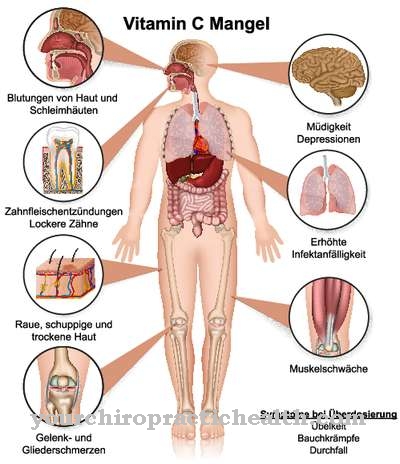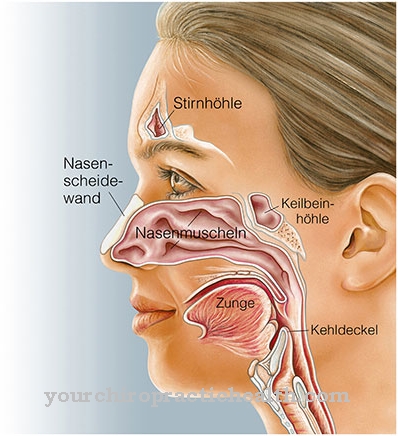The Dubowitz syndrome is a rare hereditary disease that is associated with symptoms such as short stature and facial malformations. The disease was named after the British child neurologist Victor Dubowitz.
What is Dubowitz Syndrome?

© vecton - stock.adobe.com
Victor Dubowitz described Dubowitz syndrome for the first time in 1965. The disease is an autosomal recessive [[Hereditary Disease Hereditary Disease [[which occurs rather rarely. There are currently only 150 known cases worldwide. Thus Dubowitz syndrome is one of the so-called orphan diseases. Orphan diseases are diseases that occur so rarely that they appear in a normal doctor's office no more than once a year. Dubowitz syndrome has many different symptoms.
According to the observations of Masato Sukahara and John M. Opitz, not all symptoms have to appear. The scientists found that the malformations on the face are the main diagnostic sign of Dubowitz syndrome. This occurred in 112 of 141 cases of illness. It is noticeable that despite the clear microcephaly, severe intellectual disabilities rarely occur in many patients. Most people with Dubowitz syndrome develop normally cognitively.
causes
The origin of Dubowitz syndrome is still unclear. However, it is believed that the disease is inherited through an autosomal recessive inheritance. In autosomal recessive inheritance, the defective allele is on both homologous autosomes. The disease is thus inherited regardless of gender. With autosomal recessive inheritance, both parents are usually healthy and heterozygous.
Heterozygous means that the genome of a cell has two different gene copies on both autosomes or chromosomes. The child can only become ill if both parents are carriers of the defective gene. Carriers of the defective allele are called conductors. The statistical probability that the child gets the disease from two conductors is 25 percent.
If one parent is ill and the other parent carries the characteristic, the risk increases to 50 percent. How the symptoms of Dubowitz syndrome develop is also unknown.
You can find your medication here
➔ Medicines for painSymptoms, ailments & signs
The disease can manifest itself in the form of various symptoms. A key symptom is physical retardation. Those affected often suffer from short stature. Short stature is the body length that does not correspond to the norm. In addition to undergrowth, microcephaly often occurs. In microcephaly, the head is small in size.
It is three standard deviations less than the mean for people of the same age and sex. Microcephalies are actually increasingly associated with intellectual disabilities. In Dubowitz syndrome, however, the disabilities are only mild to moderate. Half of all patients have no cognitive limitations and develop properly.
On the other hand, some patients suffer from eczema, which is accompanied by itching and reddening of the skin. Hyperactivity is also typical of Dubowitz syndrome. This is characterized by an abnormal psychological over-excitability. Those affected suffer from motor restlessness and find it difficult to concentrate.
Most patients with Dubowitz syndrome have facial deformities called craniofacial dysmorphism. These include, for example, a narrowed eyelid gap (blepharophimosis), a missing nasal saddle, an eye relief that is too large or a low ear. Malformations of the eyes and malformations of the teeth can also occur.Malformations of the digestive tract can cause symptoms such as heartburn or constipation.
Some patients develop congenital constipation due to anal stenosis. Furthermore, malformations of the central nervous system can occur in Dubowitz syndrome. Aplasia of the corpus callosum is typical. This structure is a fiber connection that runs between the two halves of the brain. The corpus callosum ensures that information can be exchanged between the two hemispheres of the brain. In some cases, hypoplasia of the pituitary gland also occurs.
This can impair the production of hormones in the pituitary gland. There are various malformations of the musculoskeletal system that can be caused by Dubowitz syndrome. Nail hypoplasia or shortening of individual fingers may appear on the fingers. Nail aplasia or nail hypoplasia are also possible on the feet. Furthermore, neighboring fingers or toes grow together.
Patients with Dubowitz syndrome often have hip dysplasia. A so-called coxa valga has also been observed in individual cases. With this axial misalignment of the femoral neck, there is a steep position. The joints of people with Dubowitz syndrome are often overmobile. Some sick children are born with spina bifida or scoliosis. Spina bifida is an embryonic occlusive disorder of the back in the area of the spine.
It is popularly known as the open back. In scoliosis, the spine deviates laterally from the longitudinal axis. Patients with Dubowitz syndrome increasingly suffer from infections such as otitis media, pneumonia, sinus infections, whooping cough or brain infections. Neurological symptoms such as migraines, cramps, bladder and anus paralysis or disturbed reflexes can also occur.
diagnosis
The diagnosis is made after a detailed clinical examination. The facial deformities and short stature provide evidence of the disease. There is no special molecular genetic or cytogenetic diagnosis for Dubowitz syndrome as yet.
Complications
Due to Dubowitz syndrome, patients are affected by various malformations that can develop all over the body. In most cases, there is also short stature. In addition to the smaller body size, the patient's head is also much smaller than usual. Often there are also discomforts on the skin.
This can cause redness and itching. The intelligence and cognitive abilities are not restricted, so that the patient can develop in an ordinary way. Heartburn can occur with malformations of the stomach or digestive tract. It is not uncommon for finger and toe adhesions to occur.
Infections that can affect the lungs or nose are also more common. In severe cases, inflammation of the brain also occurs. The malformations can trigger insecurity and self-doubt in those affected, which leads to psychological complaints. Because of the deformities, children in particular are teased and bullied.
A causal treatment of Dubowitz syndrome is not possible, which is why only the symptoms are alleviated. The person concerned must perform various examinations in order to diagnose tumors and remove them if necessary. As a rule, there is no reduced life expectancy.
When should you go to the doctor?
Dubowitz syndrome is usually diagnosed immediately after birth. The doctor can recognize the disease on the basis of the short stature and the typical facial deformities and initiate treatment immediately. If one of the parents is ill, a medical examination should be carried out before the birth. You can then decide together with the doctor how to proceed. A dermatologist can be called in if those affected suffer from eczema, itching and reddening of the skin.
A therapist can help with the hyperactivity that often occurs. Parents who notice behavioral problems in their child should also speak to a specialist in the disease. He can give further tips and assistance and refer those affected to a special clinic if necessary.
An emergency doctor should be called in the event of severe complications such as lung, brain or sinus infections. Since Dubowitz syndrome can take many forms, extensive collaboration with a team of doctors is necessary. They should be informed of all complaints and abnormalities so that the complications mentioned do not arise in the first place.
Doctors & therapists in your area
Treatment & Therapy
Dubowitz syndrome cannot be treated causally. Possible malformations can possibly be corrected surgically. Growth, overall health, language development, dental status, and cognitive development should be checked by a doctor at regular intervals. As malignant neoplasms occur frequently due to immune deficiencies in the course of the disease, a regular targeted search for tumors is necessary.
Outlook & forecast
As a rule, Dubowitz syndrome cannot be treated causally because it is a genetic disease. Those affected are therefore dependent on purely symptomatic treatment, which can limit the malformations and thereby increase the quality of life. Self-healing does not occur in this syndrome.
If Dubowitz syndrome is not treated, those affected often suffer from severe itching or heartburn. This can also lead to hyperactivity or developmental disorders in children, which also makes everyday life much more difficult in adulthood. Furthermore, the patients suffer more from various types of inflammation and in the worst case can die from them if they are not treated. Paralysis and reflexes are also common in this syndrome.
The treatment itself can only limit the symptoms, whereby a high value is placed on the normal development of the child. In addition, those affected depend on regular examinations in order to detect and treat tumors at an early stage. In most cases, the patient's life expectancy is reduced by the syndrome. The syndrome can lead not only to those affected, but also to relatives and parents, to severe mental disorders or to depression.
You can find your medication here
➔ Medicines for painprevention
Dubowitz syndrome cannot be prevented.
Aftercare
In Dubowitz syndrome, in most cases there are very few follow-up measures available to those affected. First and foremost, the disease should be recognized at an early stage so that there is no further worsening of the symptoms, which can limit the life of the person affected. Since this is a genetic disease, it cannot be completely cured either, so that only purely symptomatic treatment can occur.
If the patient wishes to have children later in life, a genetic test can also be carried out with a subsequent consultation in order to prevent Dubowitz syndrome from being passed on to the descendants. In most cases, the affected children are dependent on intensive and special support due to the syndrome so that there are no complaints during development.
Parents can significantly promote this development with various exercises. Since the syndrome can favor the occurrence of tumors, regular examinations by a doctor are very useful. In many cases, patients also rely on support from friends and family in their everyday lives.
You can do that yourself
Dubowitz syndrome is a very rare hereditary disease that is particularly characterized by short stature and malformations of the face. The disease cannot be treated causally. The patient himself can only take steps to alleviate the symptoms.
The short stature is often associated with a reduction in motor skills. Those affected should therefore start physiotherapy as early as possible, which is aimed at improving their mobility. If it becomes apparent that a child will later need helpers, parents should encourage them to learn how to use them early on.
Children who suffer from Dubowitz syndrome usually show no or only mild forms of intellectual disability. But they are very often hyperactive. In addition, you are inhibited in your development by the short stature. Parents should therefore consult experts at an early stage to ensure optimal educational and psychological support for their child. A suitable school should also be found in good time.
The children's cognitive abilities usually allow them to take part in regular lessons. However, many schools are unable to adequately care for students with significant physical retardation. This is especially true because those affected are often teased or even bullied by their peers due to their facial malformations and the teachers usually do not have the necessary social pedagogical training to cope with such situations.
























.jpg)



